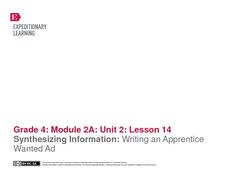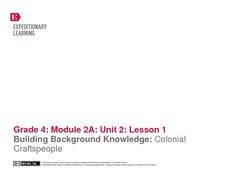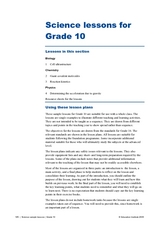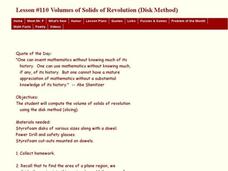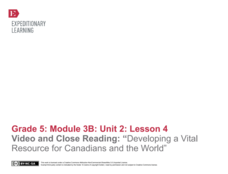Museum of Disability
Stand Tall, Molly Lou Melon
Help to create the next generation of friends with a lesson about accepting people who are different. As kids read Stand Tall, Molly Lou Melon, they answer a series of discussion questions and activities about making friends...
Museum of Disability
Rolling Along
Kindness and empathy can be as important as reading comprehension skills, especially for younger learners. Reinforce both with a lesson based on Rolling Along: The Story of Taylor and His Wheelchair by Jamee Riggio Heelan. As...
EngageNY
Synthesizing Information: Writing an Apprentice Wanted Ad
Fourth graders view examples of help-wanted ads as they plan and create their own writing in the fourteenth instructional activity of this unit on colonial trade. The engagement of the class is captured when the teacher shares an actual...
EngageNY
Building Background Knowledge: Colonial Craftspeople
In the first lesson plan of this unit on colonial trade, fourth graders gain background knowledge of different jobs performed by early colonists. The class begins with a slide show presentation that includes a variety of great...
EngageNY
Science Talk: How do Bullfrogs Survive
Following the reading of the book Bullfrog at Magnolia Circle, the ninth activity in this unit involves emerging experts in a science talk about how bullfrogs survive. Looking back through the text, young scholars prepare for the...
NASA
Erosion and Landslides
A professional-quality PowerPoint, which includes links to footage of actual landslides in action, opens this moving lesson. Viewers learn what conditions lead to erosion and land giving way. They simulate landslides with a variety of...
PHET
Planet Designer: Retro Planet Red
What does the atmosphere on Mars look like? This fourth lesson in the series of five is designed for high schoolers. Scholars apply previous knowledge to add atmosphere to Mars in an online simulation. This comprehensive lesson includes...
National Museum of the American Indian
Lone Dog's Winter Count: Keeping History Alive
What is oral tradition, and what unique tool did the Native Americans of the Northern Great Plains use to help them remember their complex histories? Through pictograph analysis, discussion, research, and an engaging hands-on activity,...
TryEngineering
Choose Your Best Way
Find the best path through town. The lesson teaches future computer programmers about networks and paths in graph theory. They develop a network of their towns to determine the most efficient path to visit each of their homes.
Overcoming Obstacles
Taking the Initiative
We can all use a little help sometimes. Middle schoolers engage in a series of activities that teach them about taking the initiative, how to make the effort, how to ask questions, and who to ask for help. They then listen to a guest...
Judicial Learning Center
The Bill of Rights and Civil Liberties
Why is the Bill of Rights so important to American's civil liberties? An important resource helps scholars find these answers and more by reading through state and federal constitutions to discover their own civil liberties. The activity...
Overcoming Obstacles
Understanding Nonverbal Messages
The Overcoming Obstacles course for middle schoolers continues with a unit module on communication. In the first lesson, participants engage in a series of activities that help them recognize nonverbal clues and the importance of making...
Newseum
The Freedom to Make a Change
As part of a study of the First Amendment, young historians research instances when individuals or groups used the First Amendment to change the United State's laws or policies. Teams are each assigned a different case study. With the...
Curated OER
How can the Internet help us research the information for our news articles?
Fourth graders write a news article. In this news article lesson, 4th graders complete research and answers the five W's about their news topic. Students understand the value of interviewing for a news article. Students...
Curated OER
Science Lessons for Grade 7
Seventh graders construct a food chain based on pictures shown on the board. In this biology instructional activity, 7th graders describe the motion of particles as energy is changed. They explain how pH changes during neutralization.
Curated OER
Science Lessons for Grade 8
Eighth graders identify the symptoms and causes of diabetes. In this biology lesson, 8th graders demonstrate how urine testing is used to diagnose illness. They explain why some metals are more reactive than others.
Curated OER
BEGINNER LEVEL LESSON PLAN ANTICIPATORY SET
Young scholars are be able to analyze primary sources for evidence of American entrepreneurship during the early 20th century. They identify the attributes that helped George Eastman succeed as an entrepreneur and consider the role...
Curated OER
The Home Front: Convincing Americans to Help America Prepare
Sixth graders examine the actions of the U.S. Government after the attack on Pearl Harbor. In this preparation for war lesson, 6th graders analyze WWII posters and view a clip on the American Home Front. Students discuss and list the...
Curated OER
Science Lessons for Grade 10
Tenth graders identify the parts and functions of the cell. In this series of science lessons, 10th graders investigate crystal formation in covalent compounds. They investigate the factors affecting reaction rates.
Curated OER
Lesson #110 Volumes of Solids of Revolution (Disk Method)
Students examine volumes of solids of revolution. In this volumes of solids of revolution instructional activity, students use the limit of a Riemann sum to find the volumes of disks or cylinders and a sphere.
Common Sense Media
Sending Email
Youngsters are introduced to the idea of communicating through e-mail, and gain important foundational knowledge for how to interact safely online.
EngageNY
Video and Close Reading: “Developing a Vital Resource for Canadians and the World”
Scholars watch Developing a Vital Resource for Canadians and the World to learn about the supplement potash that helps plants grow. They watch the video several times, completing a note catcher to record key ideas along the way....
Theodore Roosevelt Association
Theodore Roosevelt: A Presidential Timeline
Throughout his life and presidency, Theodore Roosevelt contributed to the America we know today in so many ways. An adaptable lesson prompts young historians to create a chronological timeline of Roosevelt's contributions to different...
EngageNY
Summarizing Complex Ideas: Comparing the Original UDHR and the "Plain Language" Version
The eighth lesson plan in this series continues the focus on vocabulary and increasing young readers' awareness of academic language. Pairs of learners participate in a short vocabulary review activity called Interactive Words in which...


